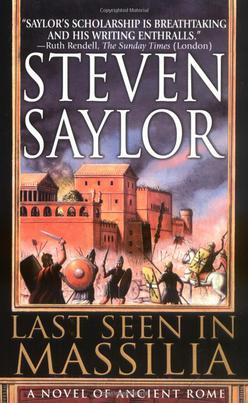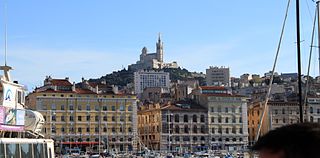Year 49 BC was a year of the pre-Julian Roman calendar. At the time, it was known as the Year of the Consulship of Lentulus and Marcellus. The denomination 49 BC for this year has been used since the early medieval period, when the Anno Domini calendar era became the prevalent method in Europe for naming years.
Musaeus, Musaios or Musäus may refer to:
Decimus Junius Brutus Albinus was a Roman general and politician of the late republican period and one of the leading instigators of Julius Caesar's assassination. He had previously been an important supporter of Caesar in the Gallic Wars and in the civil war against Pompey. Decimus Brutus is often confused with his distant cousin and fellow conspirator, Marcus Junius Brutus.
Gennadius or Gennadios may refer to:
Gennadius of Massilia, also known as Gennadius Scholasticus or Gennadius Massiliensis, was a 5th-century Christian priest, monk, and historian.

Massilia Sound System is a reggae band from Marseille, France, formed in the early 1980s.

The siege of Massilia, including two naval engagements, was an episode of Caesar's Civil War, fought in 49 BC between forces loyal to the Optimates and a detachment of Caesar's army. The siege was conducted by Gaius Trebonius, one of Caesar's senior legates, while the naval operations were in the capable hands of Decimus Brutus, Caesar's naval expert.

Euthymenes of Massalia was a Greek explorer from Massalia, who explored the coast of West Africa as far, apparently, as a great river, of which the outflow made the sea at its mouth fresh or brackish. His published accounts have not survived, but seem to have been known, at least at secondhand, by Plutarch, who writes "Euthymenes the Massilian concludes that the Nile is filled by Oceanus and that sea which is outward from it, the latter being naturally sweet." Euthymenes thought that this river was the Nile, but the river in question may have been the Senegal.
Marseille is the second-largest city of France.

The genus Massilia belongs to the family Oxalobacteriaceae, and describes a group of gram-negative, motile, rod-shaped cells. They may contain either peritrichous or polar flagella. This genus was first described in 1998, after the type species, Massilia timonae, was isolated from the blood of an immunocompromised patient. The genus was named after the old Greek and Roman name for the city of Marseille, France, where the organism was first isolated. The Massilia genus is a diverse group that resides in many different environments, has many heterotrophic means of gathering energy, and is commonly found in association with plants.
A private signal is a custom-designed flag used to symbolize and identify the owner of a boat. They generally have a swallowtail shape but may instead be rectangular or sometimes triangular. Private signal tradition is drawn from heraldry but typically does not incorporate as intricate designs as a coat of arms.
Marsiglia is the Italian name of the French city of Marseille.

Last Seen in Massilia is a historical novel by American author Steven Saylor, first published by St. Martin's Press in 2000. It is the eighth book in his Roma Sub Rosa series of mystery stories set in the final decades of the Roman Republic. The main character is the Roman sleuth Gordianus the Finder.

Marseille, formerly spelled in English as Marseilles, is the prefecture of the French department of Bouches-du-Rhône and capital of the Provence-Alpes-Côte d'Azur region. Situated in the Provence region of southern France, it is located on the coast of the Gulf of Lion, part of the Mediterranean Sea, near the mouth of the Rhône river. A resident of Marseille is a Marseillais.
The 2014 Elite Gym Massilia competition was a competition held in Marseille, France from November 14–16.

Oréane Caroline Marie Lechenault is a retired French female artistic gymnast. She finished fourth alongside her teammates at the 2016 Gymnastics Olympic Test Event in Rio de Janeiro, and she represented France at the 2016 Summer Olympics. She won a bronze medal in the team final at the 2016 European Championships.

Massalia was an ancient Greek colony (apoikia) on the Mediterranean coast, east of the Rhône. Settled by the Ionians from Phocaea in 600 BC, this apoikia grew up rapidly, and its population set up many outposts for trading in modern-day Spain, Corsica and Liguria. Massalia persisted as an independent colony until the Roman campaign in Gaul in the 1st Century BC. The ruins of Massalia still exist in the contemporary city of Marseille, which is considered the oldest city of France and one of Europe's oldest continuously inhabited settlements.

The Spartiates de Marseille, formally known as Marseille Hockey Club, are an ice hockey club based in Marseille, Bouches-du-Rhône, France. The team plays at Palais omnisports Marseille Grand-Est, which is the country's largest permanent ice rink by capacity. The 2023–24 season will mark their debut at the highest national level, the Ligue Magnus.

Crinas (Crinias) of Marseilles was a 1st-century physician from Massilia (Marseilles), contemporary of the Emperor Nero. He practiced medicine in Massilia, having mathematical and astrological knowledge. What we know about him comes from a few lines of Pliny the Elder in his Natural History, book XXIX, 5 (9).
Charmis of Marseilles was a famous Roman physician. A native of Massilia, he came to Rome during the reign of Nero. Pliny counted him as a "completely Greek physician". He achieved great fame and fortune in Rome by introducing the practice of cold bathing, which supplanted the astrological medicine of his fellow townsman Crinas. Crinas had in turn supplanted Thessalus, who followed the principles of the Methodic school of medicine.









